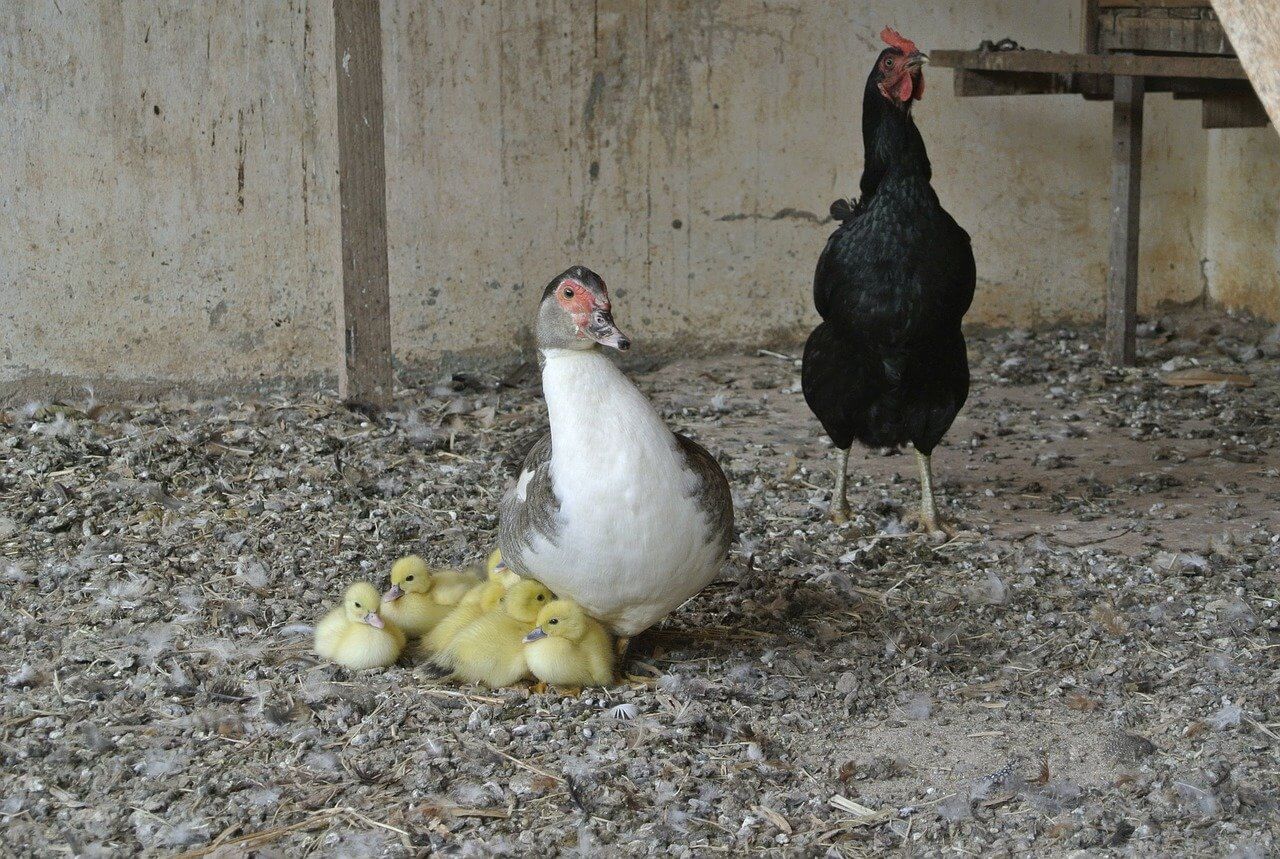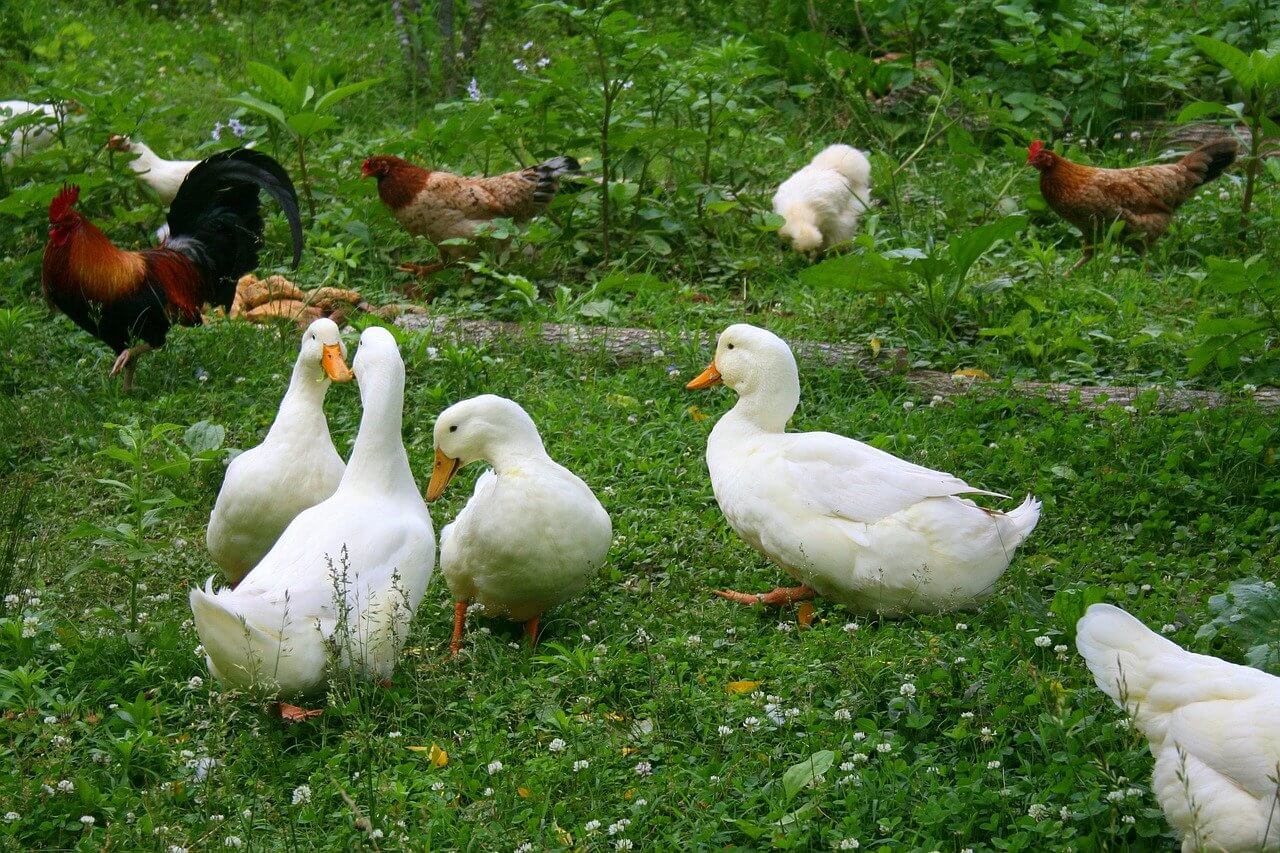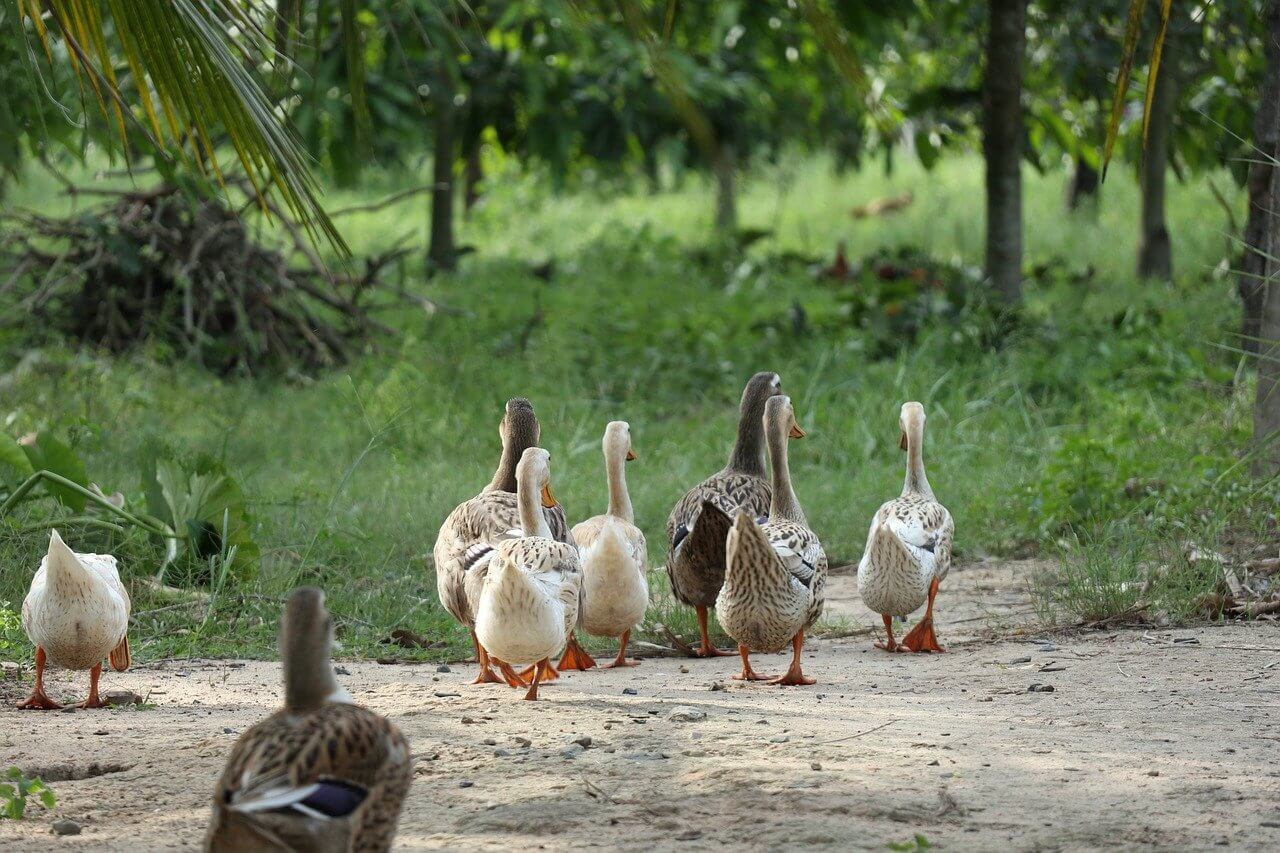While it is possible for ducks and chickens to coexist, there are a few conditions that need to be met to keep them happy. In this article, we answer some frequently asked questions about the differences and similarities between ducks and chickens and provide sound advice on helping them to cohabitate. Can ducks and chickens live together? Read on to learn more.
What You'll Learn Today
- Can You Raise Chickens And Ducks Together? Explained
- 1. Can chickens and ducks sleep in the same coop?
- 2. What kind of perch do chickens need?
- 3. How much space do ducks and chickens need in the coop?
- 4. Will ducks and chickens nest together?
- 5. What happens if a chicken incubates a duck egg or vice versa?
- 6. Do chickens and ducks like each other?
- 7. Can ducks and chickens eat the same kind of food?
- 8. How do you feed ducks and chickens together?
- 9. What kind of snacks and kitchen scraps can ducks and chickens eat?
- 10. How can you set up a good watering system for ducks and chickens?
- 11. How do you provide water for ducks and chickens during freezing weather?
- 12. Why do ducks need so much water?
- 13. When do you need a rooster or drake?
- 14. How can you keep ducks and chickens safe from predators?
- 15. Do ducks have to sleep in a coop?
Can You Raise Chickens And Ducks Together? Explained
1. Can chickens and ducks sleep in the same coop?
Chickens and ducks can sleep in the same coop as long as you provide them with the right kind of sleeping arrangements. Chickens go into the coop of their own accord as soon as the sun begins to set. They like to hop up onto a perch for safety, and this is where they typically sleep.
Ducks may need to be herded into the coop at night; although, sometimes if they are living with chickens, they pick up the habit of going in at dusk and this can be quite helpful.
Once inside the coop, ducks like to settle on the ground to sleep. For this reason, you’ll need to set up their sleeping area away from the chickens’ perches. If the ducks sleep underneath the chickens, they will wake up very messy. Poultry exposed to unsanitary conditions may develop eye infections and need treatment with antibiotics.
The ducks’ sleeping space should be enclosed and cozy. They like to hide while they are sleeping. It’s a good idea to set up duck nest boxes deeply filled with straw or shavings on the opposite side of the coop from the chickens’ perches. You may also need to enclose the area underneath the perches with wire mesh to prevent the ducks from accessing that area.
For either ducks or chickens or the two combined, you need to make certain that your coop is secure from predators and has proper ventilation. Sleeping ducks and chickens are easy prey for small predators such as foxes, weasels, raccoons, possums and the like.
Place vents under the eaves and/or near the peak of the roof to allow water vapor to escape. If the interior of your coop is too humid, your chickens are very likely to develop frostbite in the winter and respiratory illnesses year-round.
In addition to making sure your duck and chicken coop is properly ventilated, you must also make sure that it is properly insulated. Ducks are fairly cold hardy, and they will even go outside and tromp around in the snow a bit. Chickens are not especially cold hardy. In the cold winter months, they will prefer to stay indoors.
2. What kind of perch do chickens need?
The best perch for chickens is a plain 2×4 suspended a couple of feet off the ground. Put it with the broadside up so the hens can settle in and tuck their feet under their feathers for warmth.
3. How much space do ducks and chickens need in the coop?

For each duck or chicken that you have, you will need to provide three square feet of floor space.
4. Will ducks and chickens nest together?
Chickens may be a bit standoffish from ducks initially, but as they get use to them they may very well share nest boxes for egg laying but not for sleeping.
5. What happens if a chicken incubates a duck egg or vice versa?
If a chicken incubates a duck egg, it is not especially problematic, as long as the duckling doesn’t eat any medicated feed and gets enough B vitamins . A duckling can be raised by a chicken and will set off on its own to find water when nature tells it to.
On the other hand if a duck hen raises a chick, it could lead to disaster. Chicks need medicated feed. Furthermore, they are not especially smart, and will follow whatever they imprint on as soon as they hatch. Chicks raised by a duck mom may very well follow her into the water and drown.
Luckily, this is not usually a problem as broody hens of all sorts tend to guard their nests and will not allow another mother to come along and lay an egg.
6. Do chickens and ducks like each other?
Generally speaking, chickens and ducks tolerate each other. If you’re going to run chickens and ducks together, it’s best to have at least three chicken hens and three duck hens. Both chickens and ducks are social animals, and they need to have a couple of friends each.
7. Can ducks and chickens eat the same kind of food?
If you plan to just keep ducks and chickens for egg production, feeding them should be no problem at all. Adult ducks and chickens can live happily on standard egg layer crumbles. Additionally, both ducks and chickens enjoy kitchen scraps, and both like to be able to free range in an open setting to forage for bugs, slugs, plant seeds and the like.
If you plan to keep them to raise ducklings and chicks, you will run into problems. This is because ducklings need quite a bit more niacin than chicks do. Additionally, in terms of lifestyles, ducklings must have water available when they’re ready to leave the nest, but chicks should be kept away from it.
Another reason why it’s not a good idea to raise ducklings and chicks together is that chicks need medicated feed. It is absolutely essential that you never feed ducklings medicated feed as it will kill them.
Niacin is also essential for ducklings, but not so much for chicks. Ducklings that do not get enough niacin can develop a condition known as wry neck.
Adding niacin rich brewer’s yeast to feed for chicks, ducklings, and adult fowl is usually a good idea in any event.
8. How do you feed ducks and chickens together?

Begin by determining the amount of food you need to provide to keep your animals healthy. Generally speaking, an adult duck or chicken hen needs between four and eight ounces of feed daily. Provide this first thing in the morning and allow your ducks and chickens to snack all day.
In the afternoon, you may wish to toss out kitchen scraps as a treat. Always be sure that the kitchen scraps you provide are healthy and natural. Poultry does not benefit any more than we do from junk food.
Although chickens do not need as much niacin as ducks do, sprinkling brewer’s yeast over the food for both ducks and chickens can be quite beneficial. Brewers yeast provides niacin, and this is a B vitamin. It’s not possible to get too much of it, so what the chickens don’t need they will simply expel. B vitamins and C help to boost the immune system.
Both chickens and ducks can suffer from an impacted crop. This happens when they eat unnatural things such as rubber bands, string, bits of plastic, etc. To avoid impacted crop, you should keep your property tidy and always keep your poultry supplied with some sort of grit. Check your feed store for poultry grit or for oyster shell.
9. What kind of snacks and kitchen scraps can ducks and chickens eat?
Both ducks and chickens are omnivorous, so they can eat any kitchen vegetable scraps, meat scraps and grains. It’s probably wise not to feed them dairy products as this is entirely unnatural.
When they’re allowed to free range, chickens and ducks eat all sorts of bugs, small vermin such as mice, shrews and the like and small amphibians such as frogs. They also eat snails and slugs.
Additionally, ducks eat all sorts of aquatic creatures such as fish, tadpoles, frogs, aquatic snails, clams, oysters, and more.
Generally speaking, free range fowl will eat just about anything that they can fit into their mouths.
10. How can you set up a good watering system for ducks and chickens?
Ducks and other poultry can contract botulism if their water is contaminated or stagnant. It’s very important that you keep your ducks swimming and playing water nice and clean and that you change the drinking water at least once a day.
If you just have a small, mixed flock of duck and chicken hens, you can set up a small wading pool for the ducks to enjoy and put out a dish of water for the chickens and simply empty them and refill them with clean water daily.
In this situation, you would want to withhold water inside the coop because while chickens sleep all night long, ducks get up frequently and like to make a mess with the water.
For this reason, you’ll need to set up your coop so that your ducks and chickens are only in it at night time and are without water during that time but able to get out to drink and enjoy water first thing in the morning and all day until dusk.
If you have ducklings and chicks, you’ll need to keep your hens and chicks separate from your duck moms and babies. As soon as mama duck takes the babies away from the nest, she will go in search of water.
This is fine for ducklings because when they’re ready to leave the nest, their feathers are coated with oil and they are fairly waterproof. Chicks are never waterproof. If they get into deep water, they will simply get soaked and drown.
11. How do you provide water for ducks and chickens during freezing weather?
During very cold winters, providing your mixed flock with drinking water may be a challenge. You may find that watering the chickens inside the coop using chick feeder dishes will work, but you’ll need to refill the dishes frequently.
The small openings on the tops of these dishes make it possible for chickens to dip their beaks in and get a drink, but ducks, with their bigger beaks will not be able to.
In wintertime, you can to provide the ducks with a larger heated water dish that you can empty and refill several times a day to provide them with ample water for eating, drinking and cleaning themselves. Place this under shelter just outside the coop to prevent them making a mess in the coop.
12. Why do ducks need so much water?

These water fowl need water to keep themselves clean and to swallow correctly. When a duck eats, it immediately takes a drink of water to help wash the food down. Additionally, ducks hunt for food in water if they have a pond that has live prey such as small frogs, fish, crawdads, and the like.
If ducks are not able to get into water, the preen gland which is located at the base of the tail will stop working. This will cause the feathers to be non-oiled so that the bird will not be waterproofed. This condition is known as wet feather and can lead to chilled, frostbitten and even drowned ducks.
13. When do you need a rooster or drake?
If you are only keeping your chickens and ducks for eggs, you never need a rooster or drake. If you’re trying to raise ducks and chickens for meat, you’re probably better off keeping them separately.
If you run a drake and a rooster together, they may fight. If you run a drake with chicken hens, he may kill them trying to mate with them. This is because ducks are simply anatomically different than chickens.
14. How can you keep ducks and chickens safe from predators?
As we’ve mentioned, your coop should be absolutely predator proof. It’s a good idea to have a wire mesh floor covered by soil and/or gravel.
Alternately, you could have a concrete or wooden floor. Make sure that there are no holes or other means of access for small predators. You should have a door that latches, and you must be vigilant about letting your chickens out promptly at dawn and locking them up promptly at dusk.
TIP: If you have trouble keeping up with opening and closing the doors at dawn and dusk, you can install automatic doors.
Surrounding your coop, you should have a large fenced area that allows all of your animals plenty of room to roam. Your fences should be at least 6 feet high, and it’s best if you can also have a wire mesh cover or roof over the entire area to keep birds of prey out.
Your fencing should be sunk a foot deep all the way around to keep digging animals out, and the wire mesh should be no wider than 1 inch. Remember that this type of wire mesh will not keep snakes out, so if snakes are problem in your area, go for a smaller mesh.
Be sure to set up plenty of hiding spots around your duck and chicken yard. You can plant bushes, set up small dog houses or half barrels or other places where your flock can hide if birds of prey are circling overhead.
15. Do ducks have to sleep in a coop?
If your poultry pen is entirely secure with a roof and buried fencing so that no predators can get in, ducks will actually be happier sleeping in a doghouse in the yard than sleeping in the coop with the chickens.
The answer is obviously yes. In my farm, they are indeed very friendly to each other and there is rarely a “fight” or something like that.